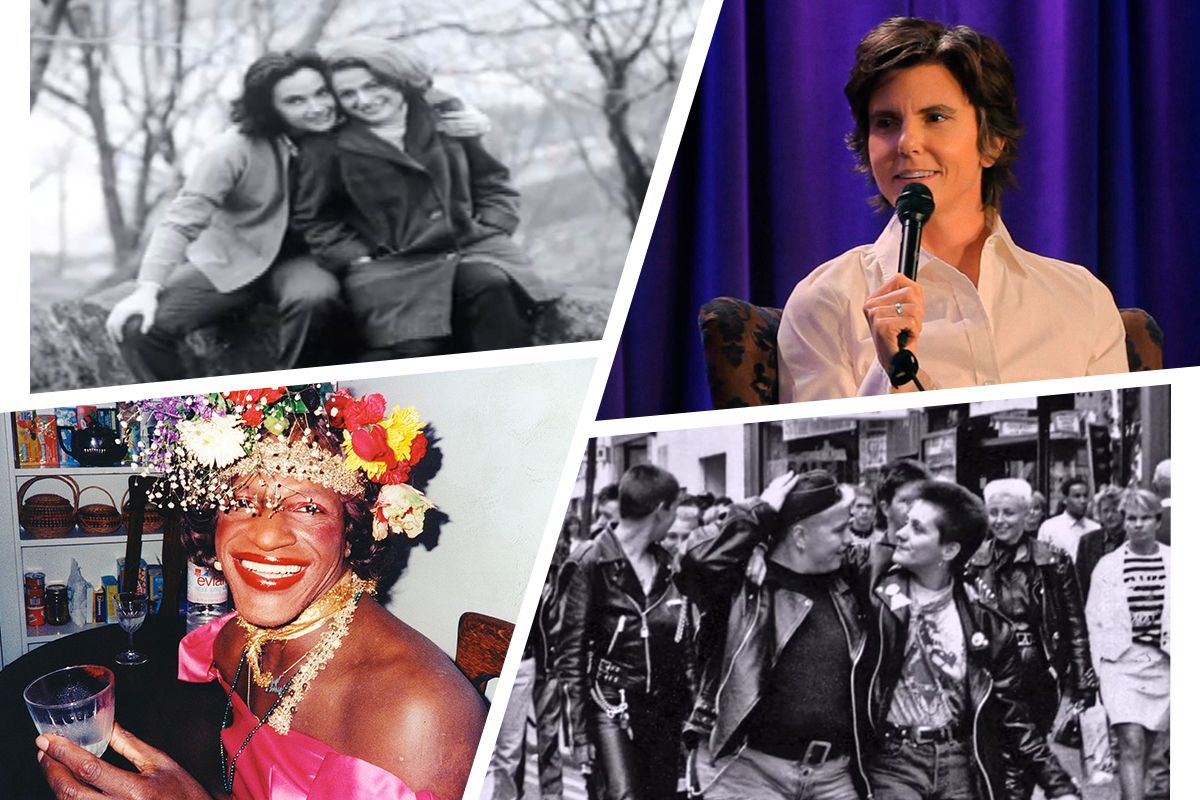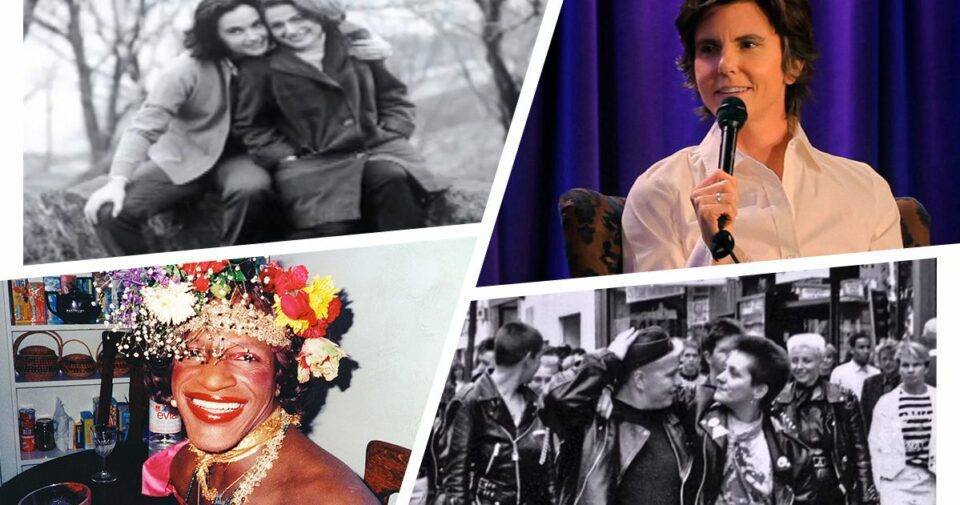[ad_1]

This list was originally published on June 22, 2021. It has been updated to include more films for Pride Month.
Documentary film bears a specific responsibility in preserving lives and legacies with its ability to visually immortalize historical movements, personal reflections, and community spaces beyond the constraints of memory. By providing communities with the opportunity to share stories of their predecessors, identities, and movements, the relationship between LGBTQ+ women and self-documentation becomes one of unyielding necessity. Whether it be challenging the chronology of queer history or piecing together a profile of an underappreciated individual, documentary film is a vehicle of visibility.
From 1920s lesbians appreciating art in Paris to a retired Illinois couple coming out after six decades together, here is a collection of 16 emblematic LGBTQ+ women-focused documentaries to add to your watchlist this Pride Month.
Last Call at Maud’s (1993)
Established in the 1960s, Maud’s was the longest-lasting lesbian bar in the United States, serving guests for a quarter-century. Last Call at Maud’s sees patrons congregating at this lesbian holy ground to bid farewell on its last evening of service. Paris Poirier’s documentary structures itself around this lesbian alumni reunion, framing nostalgic retellings of memories from Maud’s with an oral history that paints a picture of the cherished landmark in its prime as not only a bar but a community center, support system, and cultural institution. The legacy of Maud’s lives on beyond the memories of its frequenters in this incisive history lesson on 20th-century lesbian culture. (Available on Amazon Prime.)
Paris Was a Woman (1996)
Paris is the city of light and love and, in Greta Schiller’s reflective 1996 documentary, “a haven for a new type of woman.” Paris Was a Woman evokes the experience of time travel, transporting viewers to a cherished era of American women expatriates in Paris during the early decades of the 20th century. This creative milieu of renowned lesbian and bisexual modernists, including the likes of Gertrude Stein, Alice B. Toklas, and Sylvia Beach, is placed under a distinctly feminist lens as Schiller’s poetic documentary elucidates their newfound freedom south of the Seine. Schiller’s filmmaking prowess emerges through a culmination of music, literature, and interviews — but the 16mm archival film images, black-and-white dreams, are the most memorable. (Available on Kanopy.)
No Secret Anymore: The Times of Del Martin & Phyllis Lyon (2003)
Two regulars at Maud’s, Del Martin and Phyllis Lyon, are given their own spotlight in Joan Biren’s intimate documentary. In the annals of queer history, the couple’s names stand as monoliths of contemporary LGBTQ+ activism. Martin and Lyons were the founders of the influential lesbian organization Daughters of Bilitis and the writers of the seminal lesbian bible Lesbian/Woman, and Biren’s discerning film traces their rich lives and uncompromising work over half a century. Fondly informative and underscored with a delightful sense of humor, the couple’s discussions guide this nuanced documentary dedicated to their revolutionary lives. (Available on Amazon Prime and Kanopy.)
Screaming Queens: The Riot at Compton’s Cafeteria (2005)
In Susan Stryker’s impressive body of work, Screaming Queens: The Riot at Compton’s Cafeteria marked her first venture into film. Both a historical documentation and an illuminating cultural artifact, the participatory documentary relives the 1966 San Francisco riot — believed to be the first known collective act of resistance against police harassment of LGBTQ+ people, particularly transgender women, in U.S. history — in searingly personal detail. Candid before the lens, Stryker reminisces with a handful of individuals who were present on that August night, many of them trans women like herself. Stryker extracts these historical memories of transgender activism from the archives and restores the event into the timeline of LGBTQ+ liberation. (Available on Amazon Prime and Kanopy.)
Edie & Thea: A Very Long Engagement (2009)
Susan Muska and Gréta Olafsdóttir’s undeniably adorable documentary begins with a slideshow of images of Edith Windsor and Thea Spyer in their youth while they, in their late 70s at the time of filming, remark in awe at each other’s beauty. With the full trust of its subjects, Edie & Thea: A Very Long Engagement is a scrapbook of this couple’s journey to a lawful marriage after 42 years of travel, laughter, sex, and activism. In the years after the documentary’s release, the film has taken on a new life in the context of Windsor’s activism. The most prominent example: her landmark civil-rights case suing the U.S. federal government for denying the recognition of her same-sex marriage. (Available on Tubi and Freevee.)
Regarding Susan Sontag (2014)
Released a decade after the writer’s death, Regarding Susan Sontag charts the words, life, and legacy of one of the most provocative thinkers of the 20th century. Navigating the incongruous relationship between Sontag’s public persona and the woman known by her friends, peers, and lovers, Nancy Kates’s documentary contemplates Sontag with a scrutiny that parallels the literary icon’s intelligent inspection of the world. Applying the rebellious cultural voice of Sontag’s oeuvre, read by Patricia Clarkson, alongside a wealth of archival footage and confidential diary entries, this intricate portrait introduces a version of Sontag previously reserved only for behind closed doors. (Available on Kanopy and Tubi.)
Tig (2015)
In Tig, documentary filmmaking is melded with a stand-up-comedy sensibility for a hybrid film about Tig Notaro’s personal life. This story begins in 2012 with the comic’s breast-cancer diagnosis, a revelation she received just before stepping onto the stage at L.A. comedy club Largo, where she went on to deliver a viral set that skyrocketed her career. Alongside this journey, the comedian attempts to become pregnant with her fiancée, Stephanie Allynne, while grieving her late mother. Equal parts poignant and comical, Tig provides intimate and deeply human insight into finding the laughter in the darkness. (Available on Netflix.)
Jewel’s Catch One (2016)
Jewel’s Catch One preserves the legacy of one of America’s first Black LGBTQ+ discos while honoring its incredible owner, Jewel Thais-Williams. C. Fitz’s film palpably immerses itself in the exuberant energy of the neon-lit dance floor with impressive assiduity through archival footage collected from the club’s patrons, who express nothing but heartfelt gratitude to the beacon of support that is Jewel. The film is a portrait of a working-class Black lesbian whose trailblazing commitment to creating a safe space for Black and LGBTQ+ communities was monumental. A historically significant film brimming with dance music from the past four decades, Jewel’s Catch One acts as a reminder of the importance of physical touchstones for collective solidarity. (Available for public screening via Array.)
The Death and Life of Marsha P. Johnson (2017)
The Death and Life of Marsha P. Johnson is perhaps one of the most recognizable LGBTQ+ documentaries on this list. David France, an American investigative reporter turned filmmaker, documents Victoria Cruz’s reopening of the case of Marsha P. Johnson’s death. Johnson was a trans-rights activist whose crucial work predated the 1969 Stonewall riots. Cruz’s own trans-rights activism leads this investigation, which unravels the nuances of Johnson’s lasting legacy. Facing endless obstacles, the documentary is a reflection of the continued institutional failure and violence that trans women of color face. The Death and Life of Marsha P. Johnson is a timely portrait, one that balances a critical and celebratory tone. (Available on Netflix.)
Dykes, Camera, Action! (2018)
A collection of voices from the world of film, including directors Barbara Hammer, Rose Troche, and Cheryl Dunye, unite in Caroline Berler’s encyclopedic documentary, which pays tribute to cinematic works that gave lesbians visibility onscreen. Centered on women who love women and make films, Dykes, Camera, Action! is an unofficial sister to the seminal documentary The Celluloid Closet (1995) with its contemporary update on the discussion of lesbian and bisexual representation in cinema. Offering insightful deliberations on the language of queer cinema — which exists in the spaces between dialogue — the documentary is both an accessible window into the films of queer women and a wonderfully composed filmography of recommended viewing. (Available on Kanopy.)
A Secret Love (2020)
Like Edie & Thea: A Very Long Engagement, A Secret Love focuses on an elderly lesbian couple reminiscing about their life together and their love, which lasted a lifetime. Observational in approach, this film by documentarian Chris Bolan follows the charming personalities of his two great-aunts, Pat and Terry, over the course of five years. The couple, who kept their love a secret for six decades before finally admitting they weren’t just roommates, are the basis for a poignant exploration of coming out later in life. Both tear-jerking and heartwarming, A Secret Love is an endearingly wholesome gold mine brimming with riveting, entertaining musings. (Available on Netflix.)
Angèle (2021)
In her self-titled Netflix documentary, Belgian singer-songwriter Angèle documents an extraordinary rise to pop-girlie stardom. A 2018 breakout, after touring summer festivals and releasing her debut album, Brol, Angèle’s ascent to fame came with a slice of self-discovery about her sexuality. As she navigates celebrityhood, the camera follows her as she experiences the highs of playing sold-out shows to adoring fans and the lows of being booed for playing keys on rapper Damso’s tour. The documentary sees Angèle open up beyond the fantastical, made-up stage version of herself and share more about her true self, like coming out as a bisexual woman. Despite the massive newfound attention, Angèle doesn’t shy away from her queerness but invites her fans into her sanctuary to reveal her true self. (Available on Netflix.)
Pretend It’s a City (2021)
Ever thought you’d like author and lesbian icon Fran Lebowitz to guide you around New York City? Well, Pretend It’s a City has got you covered. Lebowitz wanders the streets of the Big Apple with sardonic commentary (complaining) on every topic you can imagine, from her pure hatred of Times Square to that time when Leonardo DiCaprio vaped with her. In the company of her bestie, Martin Scorsese, who also directed the documentary, Lebowitz’s musings on NYC are punctuated by her walk-and-talk tour of the city she loves to loathe. (Available on Netflix.)
Rebel Dykes (2021)
Rebel Dykes is a comprehensive oral history of London’s 1980s lesbian scene, which hosted the collision of underground punk and feminism. Harri Shanahan and Sian Williams’s boisterous documentary stitches together archival footage, home video, interviews, and imaginatively realized animations into a patchwork of admiration for this little-known lesbian community and its radical work in politics, music, art, and sex. In spotlighting this group of artists and activists, this self-documentation allows those who were present, and who marched in a uniform of leather jackets and Doc Martens, to reflect on and reinstate their place in Britain’s queer history. (Available on Apple.)
The Lesbian Bar Project (2022)
The Lesbian Bar Project investigates the rapid disappearances of lesbian bars across America, from 200 establishments in the 1980s to just over 30 today. Filmmakers Erica Rose and Elina Street set off in 2021 to raise awareness, with a short documentary, about the bar owners, community activists, and patrons of these lesbian institutions.
In 2022, the directors expanded their search and made an uplifting three-part series spotlighting lesbian bars in Houston, Phoenix, and New York. Here, Rose and Street welcome viewers into these important spaces where there’s an inclusive atmosphere (using the label “Lesbian and …” ) and deep-rooted queer history. (Available to stream on Roku.)
Related
- 40 Essential Lesbian Romance Films
- 55 Essential Queer Horror Films
- What’s Happening to ‘Queer’ Cinema in the LGBT Film Boom?
[ad_2]
Emily Maskell , 2024-06-18 22:30:00
Source link



